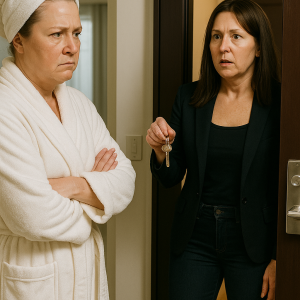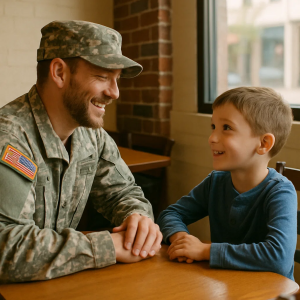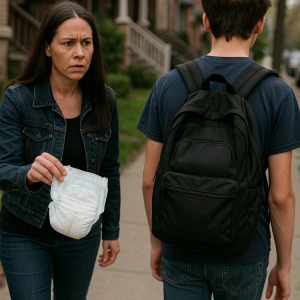My Fiancé Made His 7-Year-Old Daughter Cook & Clean Daily. I Recorded His Lies & Brought Her Mother Back… At first, I found it endearing, almost quaint, that my future stepdaughter woke before dawn to prepare elaborate breakfasts and meticulously clean the house. But everything changed when I discovered the heartbreaking, almost sinister reason behind this seven-year-old’s fixation on being the perfect homemaker.
I noticed it gradually. Elara, my future stepdaughter, would tiptoe down the stairs before sunrise, her small feet making soft thuds on the carpet.
She was only seven, barely reaching the kitchen counter, but there she was every morning, diligently mixing pancake batter or scrambling eggs, her tiny brow furrowed in concentration.
I thought it was sweet at first. Most kids her age were still lost in dreams about unicorns or whatever first graders dream about, but Elara seemed like the poster child for a remarkably responsible child.
But when I realized this was her daily, unprompted routine, a cold knot of worry began to form in my stomach.
The first time I caught her carefully measuring coffee grounds into the filter, her small hands trembling slightly, my heart skipped a beat.
Barely four feet tall in her faded, oversized pajamas, dark hair tied neatly in a hastily done braid, she was handling hot kitchen appliances before dawn. It didn’t feel right. It felt… forced.
“You’re up early again, sweetheart,” I said, my voice carefully neutral, watching her pour steaming coffee into cups.
The kitchen counters gleamed, and the smell of fresh coffee filled the air. “Did you clean in here?”
Elara beamed at me, her gap-toothed smile so eager it made my heart ache. “I wanted everything to be nice when you and Daddy woke up. Do you like the coffee? I figured out how to use the machine!”
The pride in her voice struck me as odd.

Sure, kids often enjoy learning “adult” tasks, but something in her tone felt too desperate to please, too anxious for approval.
I glanced around the kitchen. Everything was spotless, and Elara had laid out breakfast like a magazine spread, every napkin perfectly folded.
How long had she been up? How many mornings had she spent perfecting this routine while we slept, while Leo, her father and my fiancé, slept soundly beside me?
“That’s really thoughtful of you, but you don’t have to do all this,” I said, helping her down from the stool. “Why don’t you sleep in tomorrow? I can make breakfast.”
She shook her head vigorously, her braid bouncing. “I like doing it. Really! I have to do it.”
The urgency in her voice, that last, almost frantic whisper, set off blaring alarm bells in my head. No child should sound that anxious, that obligated, about chores.
Leo wandered in then, stretching and yawning. “Something smells amazing!” He ruffled Elara’s hair as he grabbed a mug of coffee. “Thanks, princess. You’re turning into quite the little homemaker.”
I shot him a look, but he was too busy scrolling through his phone to notice. The word “homemaker” landed like a stone in my chest, heavy with something sour and deeply unsettling.
Elara’s face lit up at his praise, and my unease solidified into concrete dread.
This became our routine—Elara playing housekeeper while we slept, me watching with mounting concern, and Leo accepting it as if it were perfectly normal, a charming quirk.
But there was nothing normal about a child so driven to do chores, especially ones she’d taken on herself. There was nothing cute about the dark circles forming under her eyes or the way she’d flinch, almost imperceptibly, when she dropped something, as if bracing for punishment.
One morning, as we cleaned up after breakfast—I insisted on helping despite her protests—I decided to dig deeper.
The question had been gnawing at me for weeks, a persistent, chilling whisper, and I couldn’t ignore it any longer.
“Sweetheart,” I said, kneeling beside her as she wiped the table, “you don’t have to wake up so early to do all this. You’re just a kid! We should be taking care of you, not the other way around.”
She kept scrubbing at an invisible spot, her small shoulders tense, her eyes fixed on the task. “I just want everything to be perfect. So Daddy won’t be sad.”
Something in her voice made me pause, a cold premonition.
I gently took the cloth from her hands, noticing her fingers tremble slightly. “Elara, honey, tell me the truth. Why are you working so hard? Are you trying to impress us?”
She wouldn’t meet my eyes, fidgeting with the hem of her shirt. The silence stretched, heavy with unspoken words, with a child’s desperate secret.
Finally, she whispered, so softly I almost didn’t hear it, “I heard Daddy talking to Mommy on the phone. He said… he said if I wasn’t a good girl, and if the house wasn’t perfect, then Mommy wouldn’t come back. He said she left because the house was messy and I wasn’t good enough.” Her lower lip trembled. “I’m afraid if I don’t do these things, Mommy won’t ever come home. And Daddy will be sad forever, and it will be my fault.”
Her words hit me like a physical punch, knocking the air from my lungs. I stared at this precious child, carrying the crushing weight of such a monstrous lie, and felt something inside me snap.
Her mother left because the house was messy and Elara wasn’t good enough? Leo had told me Elara’s mother, Serena, had simply “moved away for work” and would “visit when she could.” He had painted a picture of a mutual, amicable separation. This was a deliberate, calculated lie, designed to manipulate a child.
“This is not happening,” I muttered, my voice trembling with a cold, terrifying fury. “Not in my house. Not to this child.”
My blood boiled. I stood up, my hands clenched into fists, the innocent breakfast scene suddenly a battlefield. Leo hadn’t just been “joking” or “old-fashioned.” He had been emotionally abusing his daughter, systematically crushing her spirit, using her desperate longing for her absent mother as a weapon.
I didn’t yell. My voice was low, trembling with a cold, controlled rage. “Leo,” I said, walking into the living room where he was still engrossed in his phone. “We need to talk. Now.”
He looked up, annoyed. “Can it wait, Anya? I’m busy.”
“No,” I stated, my voice unwavering. “It cannot. It’s about Elara. And it’s about the lies you’ve been telling her about her mother.”
His eyes narrowed. “What are you talking about?”
I repeated Elara’s words, verbatim, my voice laced with the pain of her confession. “She thinks her mother left because the house was messy and she wasn’t ‘good enough.’ She thinks if she doesn’t do all the chores, Serena won’t come back, and you’ll be ‘sad forever’ because of her.”
Leo’s face went blank, then a flicker of something—not guilt, but cold, calculating anger—crossed his features. “Elara said that? Oh, come on, Anya, it was just a way to motivate her! Serena did complain about the mess, and Elara was a messy kid. I just… exaggerated a little to make her understand the importance of responsibility.” He waved his hand dismissively.
“Exaggerated?” I exploded, my voice finally rising. “You think telling a seven-year-old that her mother abandoned her because of her behavior is ‘exaggerating’?! You are teaching her that love is conditional, that her worth is tied to her domestic servitude, that she is responsible for the happiness of adults! This isn’t ‘motivation,’ Leo! This is emotional abuse! You are crushing her spirit, making her carry a burden no child should ever bear!”
He stood up, his face hardening. “Don’t be so dramatic, Anya. It’s how I was raised. My mother always said a tidy home kept a happy family. Besides, Serena did leave. I just gave Elara a reason she could understand.”
“And what was the real reason, Leo?” I shot back, the words stinging. “Because I’m willing to bet it had nothing to do with a messy house and everything to do with your manipulative, controlling nature!”
The argument escalated, raw and ugly. He accused me of being “too sensitive,” of trying to “turn his daughter against him.” I accused him of being a pathological liar, a manipulator, and a truly terrible father. The engagement ring suddenly felt like a lead weight on my finger, a symbol of a future built on a foundation of lies.
That night, I moved into the guest room. I couldn’t look at him. I couldn’t be in the same bed as a man who would so cruelly twist a child’s love and longing into a tool for control.
The Unveiling: A Silent Pact and a Public Reckoning
The next morning, Elara was back in the kitchen, her small hands meticulously arranging napkins. My heart ached. I knew I couldn’t just argue with Leo; I needed to expose the depth of his deception, not just to him, but to the world.
That was the first twist. I had a secret weapon. Months ago, concerned by Leo’s evasiveness about Serena, I had hired a private investigator. What the PI uncovered was far more disturbing than a simple “moved away for work.” Serena hadn’t just moved away; she had fled, terrified, leaving behind a carefully worded but desperate letter to a trusted friend, detailing years of Leo’s escalating psychological abuse, his controlling behavior, and his threats to turn Elara against her if she ever tried to leave. Serena had made a silent pact with herself: she would disappear for Elara’s safety, hoping one day to be strong enough to return and reclaim her daughter, free from Leo’s influence. The PI had found Serena, now living under a new identity, slowly rebuilding her life, still haunted by the fear of Leo.
I didn’t confront Leo with the PI’s findings immediately. Instead, I quietly contacted Serena. I shared Elara’s heartbreaking confession, the burden she carried. Serena, hearing the extent of Leo’s manipulation, broke down. Her fear was still immense, but her love for Elara outweighed it. We formed a silent alliance, a pact to free Elara from her father’s psychological prison.
The second twist: Leo had been secretly recording conversations in the house for “security” – a fact he had once bragged about. What he didn’t know was that I had discovered his hidden microphones and, with the PI’s help, had been remotely accessing them for weeks. I had hours of recordings: Leo’s casual, cruel lies to Elara, his dismissive comments about Serena, even a chilling clip of him rehearsing his “motivational” speeches to Elara in front of a mirror. I also found recordings of his phone calls with his own mother, where he openly admitted to fabricating Serena’s reasons for leaving to “keep Elara in line.”
I now had irrefutable proof of Leo’s deliberate, systematic emotional abuse, his pathological lying, and his deep-seated psychological manipulation. But how to use it to truly shatter his carefully constructed world?
The ultimate twist came a week later. Leo, still oblivious to the full extent of my knowledge, planned a surprise “family dinner” to “make things right” with me. He invited his parents, his closest friends, and even a few colleagues from his prestigious law firm. He wanted to present a united front, to show me he was “trying.”
I arrived, dressed simply, my resolve steely. Elara, looking tired, was already setting the table, her small hands meticulously arranging silverware.
As dinner began, Leo cleared his throat. “I think we all need to talk,” he began, looking pointedly at me. “Anya has some… concerns about how we’re raising Elara.”
Before he could continue, I interrupted him. “Yes, Leo, I do. Concerns about how you’re teaching her that a woman’s worth is tied to her domestic labor, and that her mother abandoned her because she wasn’t ‘good enough.'” I then pulled out my phone. “But instead of just talking, I thought we could listen to the real story.”
I played the recordings. First, Elara’s innocent, heartbreaking confession about fearing his love. Then, the casual, demeaning comments from Leo to Elara, his dismissive remarks about Serena. And finally, the chilling clip of Leo rehearsing his lies, and his confession to his own mother about fabricating Serena’s reasons for leaving.
The dining room fell silent, a horrified, suffocating quiet. Leo’s parents, initially confused, listened in stunned disbelief, their faces paling. His friends and colleagues shifted uncomfortably, their expressions a mixture of shock and dawning disgust. Elara, who had been listening, her eyes wide, slowly started to cry, her small shoulders shaking.
Leo’s face was a grotesque mixture of shock, fury, and dawning horror. He lunged for my phone, but I was too quick, pulling it away.
“This is who you are, Leo,” I said, my voice clear and steady, despite the tears now streaming down Elara’s face. “This is what you’ve been teaching your daughter. This is why she thinks she has to earn your love by being a ‘homemaker’ before she’s even lost her first tooth.”
His parents, utterly disgusted, rose from the table. “Leo,” his father said, his voice cold, “this is unforgivable. You will get help. For Elara. For yourself. And you will face the consequences.”
Then, the front door opened. Serena, Elara’s mother, stood there, her face pale but resolute. Elara looked up, her eyes widening, then she let out a cry that was pure, unadulterated joy. “Mommy!” She launched herself into Serena’s arms.
Serena held her daughter tight, then looked at Leo, her gaze unwavering. “It’s over, Leo,” she said, her voice clear and strong. “I’m taking Elara. And I have all the evidence I need for full custody.”
I looked at Leo, who stood utterly defeated, his perfect family dinner shattered, his lies exposed, his carefully constructed world crumbling around him. I slipped the engagement ring off my finger and placed it on the table. “Our engagement is over, Leo,” I said, my voice firm. “I cannot marry a man who would break his daughter’s spirit like this, and who would use her love as a weapon.”
I didn’t just leave. I walked out with Serena and Elara, leaving Leo in the wreckage of his own making.
A New Home, A New Future
Serena and Elara moved into a small, sunlit apartment near me. It was just us, a new, unconventional family. No early morning chores, no pressure to be “perfect.” Just laughter, art projects, and the quiet joy of rediscovering what a childhood, free from manipulation, should be. Elara blossomed. She started sleeping in, playing, drawing, simply being a child. She still loved to help in the kitchen, but now it was out of genuine interest, not fear.
Leo, facing a devastating custody battle and the complete loss of his reputation, entered therapy. He slowly, painfully, began to confront the toxic beliefs and manipulative patterns he had cultivated. It was a long road, but he was finally walking it, stripped of his power, forced to face the consequences of his actions.
And me? I found a new purpose. I became a fierce advocate for children’s emotional well-being, sharing Elara’s story (with Serena’s permission) to raise awareness about subtle forms of emotional abuse. My story, once a private nightmare, became a beacon of hope and empowerment for others.
The house, once filled with the scent of Elara’s anxious breakfasts, was now a place of healing. The little girl who thought she had to earn love through chores now knew, unequivocally, that she was loved simply for being herself. And the woman who refused to let toxic patterns continue had not just broken an engagement; she had broken a cycle, and built a new, stronger, more loving future for herself, Elara, and Serena, proving that some battles are won not with anger, but with unwavering truth and a fierce, protective love.









